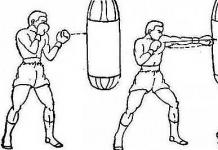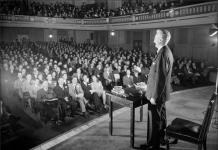At the reception: (boy 6 years old, severe neurotic disorder)
Who do you live with?
- With mom.
- And dad?
- And we kicked him out.
- Like this?
- We divorced him... he humiliates us... he is not a man... he ruined our best years...
At the reception: (teenager 14 years old, severe migraines, fainting, illegal behavior)
Why didn’t you draw dad, because you are one family?
- It would be better if he didn’t exist at all, such a dad...
- What do you mean?
- He ruined his mother’s whole life, behaved like a pig... now he doesn’t work...
- How does your dad treat you personally?
- Well, he doesn’t scold for bad marks...
- … All?
- And that’s all, ... what from him? ...I even earn my own money for entertainment...
- How do you earn money?
- I weave baskets...
- Who taught?
- Father... he taught me a lot, I can still fish... I can drive a car... I can do a little woodworking... By spring the boat has been tarred, so my father and I will go fishing.
- How can you sit in the same boat with a person who would rather not exist in the world?
- ... well, in general, we have something like this... the relationship is interesting... when my mother leaves, we are fine... It’s she who doesn’t get along with him, but I can do it with my mother and father when we’re not together...
At the reception: (6 year old girl, problems with communication, not attentive, nightmares, stuttering, bites her nails...)
Why did you only draw mom and brother, but where are dad and you?
- Well, we are in a different place so that mom is in a good mood...
- What if you all stay together?
- That's bad...
- How bad is that?
- ... ... (the girl is crying)
Over time:
- Just don’t tell mom that I love dad too, very much...
At the reception: (teenager with severe neurotic disorder)
-...Does your son really believe in his father’s death?
- Yes! We specifically told him this... otherwise God forbid he wants to meet him, then you won’t get any inheritance... but my grandmother and I only say good things about my father, so that he doesn’t worry and strives to become a good person.
At the reception: (8 year old boy, severe depression and a number of other diseases)
-...What about dad?
- Don't know…
I turn to my mother:
-You're not talking about your father's death?
- He knows, we talked about this... (mom cries), but he doesn’t ask, and doesn’t want to look at the photographs.
When mom leaves the office, I ask the boy:
-...are you interested in finding out about dad?
The boy comes to life and looks into my eyes for the first time.
- Yes, but you can’t...
- Why?
- Mom will cry again, don’t.
During my time working with children, in my practice, I had to face the following facts:
1. Children love their parents equally strongly, regardless (!!!) of the behavior they demonstrate.
The child perceives mom and dad as a whole and as the most important part of himself.
2. The attitude of a child to his father and a father to his child is always shaped by the mother. (The woman acts as an intermediary between the father and the child; it is she who conveys to the child: who his father is, what he is like and how he should be treated).
3. The mother has absolute power over the child, she does whatever she wants with him, consciously or unconsciously.
Such strength is given to a woman by nature so that her offspring can survive without unnecessary doubts.
At first, the mother herself is the child’s world, and later she brings the child into the world through herself.
The child learns the world through his mother, sees the world through her eyes, and focuses on what is important to his mother.
Consciously and unconsciously, the mother actively shapes the child’s perception.
The mother also introduces the child to the father, she conveys the degree of importance of the father.
If the mother does not trust her husband, the child will avoid the father.
At the reception:
My daughter is 1 year 7 months old. She runs away from her father screaming, and when he takes her in his arms, she cries and breaks out. And lately I started telling my father: “Go away, I don’t love you.” You are bad".
- How do you really feel about your husband?
- I am very offended by him... to the point of tears.
4. The father’s attitude towards the child is also shaped by the mother.
For example, if a woman does not respect the father of the child, then the man may refuse attention to the child.
Quite often the same situation is repeated: as soon as a woman changes her internal attitude towards the child’s father, he unexpectedly expresses a desire to see the child and participate in his upbringing.
And this is even in cases where the father had previously ignored the child for many years.
5. If attention and memory are impaired, self-esteem is inadequate, and behavior leaves much to be desired, then the child’s soul is sorely lacking a father.
Rejection of the father in the family often leads to the appearance of intellectual and mental retardation in the child's development.
6. If the communication sphere is impaired, there is high anxiety, fears, and the child has not learned to adapt to life, and feels like a stranger everywhere, then he cannot find his mother in his heart.
7. It is easier for children to cope with the problems of growing up if they feel that mom and dad accept them entirely, as they are.
8. A child grows up healthy emotionally and physically when he is outside the zone of problems of his parents - each individually and/or them as a couple. That is, he takes his childhood place in the family system.
9. The child always “holds the flag” for the rejected parent. Therefore, he will connect with him in his soul by any means.
For example, he can repeat difficult features of fate, character, behavior, etc. Moreover, the more the mother does not accept these characteristics, the more clearly they manifest themselves in the child. But as soon as the mother sincerely allows the child to be like his father, to love him openly, the child will have a choice: to connect with his father through difficult things or to love him directly - with his heart.
10. The child is equally devoted to mom and dad; he is bound by love.
But when the relationship in a couple becomes difficult, the child, by the power of his devotion and love, is deeply involved in the difficult thing that causes pain to the parents.
He takes on so much that he really does a lot to alleviate the mental suffering of one or both parents at once.
For example, a child can become psychologically equal to his parents: a friend, a partner.
And even a psychotherapist.
Or it can rise even higher, psychologically replacing their parents for them.
Such a burden is unbearable for either the physical or mental health of the child. After all, in the end, he is left without his support - without his parents.
10. When a mother does not love, does not trust, does not respect, or is simply offended by the child’s father, then looking at the child and seeing many manifestations of the father in him, consciously or unconsciously lets the baby know that his “male part” is bad. She seems to be saying: “I don’t like this. You are not my child if you look like your father.”
And out of love for the mother, or rather because of the deep desire to survive in this family system, the child still refuses his father, and therefore the masculine in himself.
The child pays too high a price for such a refusal.
In his soul, he will never forgive himself for this betrayal.
And he will definitely punish himself for this with a broken destiny, poor health, and failure in life.
After all, living with this guilt is unbearable, even if it is not always realized.
But this is the price of his survival.
To get a rough feel of what is going on in a child’s soul, try to close your eyes and imagine the two people closest to you, for whom you can, without hesitation, give your life.
And now all three of you, holding hands tightly, found yourself in the mountains.
But the mountain you were standing on suddenly collapsed.
And it turned out that you miraculously stayed on the rock, and your two dearest people hung over the abyss, holding your hands.
Your strength is running out and you understand that you can’t pull out two.
Only one person can be saved.
Who will you choose? At this moment, mothers, as a rule, say: “No, it’s better to all die together. It's horrible!"
Indeed, it would be easier, but living conditions are such that the child has to make an impossible choice.
And he does it.
Mostly towards the mother.
“Imagine that you finally let one person go and pulled out another.
-How will you feel towards someone you could not save?
-Huge, sizzling guilt.
- And to the one for whom you did it?
- Hatred".
But nature is wise - the topic of anger at one’s mother in childhood is strictly tabulated. This is justified, because mother not only gives life, she also supports it. After dad's abandonment, mom remains the only person who can support her in life.
Therefore, when expressing your anger, you can cut down the branch on which you are sitting.
And then this anger turns on oneself (auto-aggression).
“I did a bad job, I betrayed dad, I didn’t do enough to...
and only me alone.
It’s not mom’s fault - she’s a weak woman.”
And then problems with behavior, mental and physical health begin.
11. There is much more to a man than being like his own father.
The principle of masculinity is the law. Spirituality.
Honor and dignity.
Sense of proportion (internal sense of appropriateness and timeliness).
Social self-realization (work you enjoy, good material income, career) is possible only if a person has a positive image of a father in his soul.
12. No matter how wonderful the mother is, only the father can initiate the adult part inside the child. (Even if the father himself failed to build a relationship with his own father. This is not so important for the initiation process).
Have you probably met adults who are infantile and helpless like children?
They start a bunch of things at the same time, have many projects, but never finish any of them.
Or those who are afraid to start a business, to be active in social self-realization.
Or those who can't say no.
Or they don’t keep their word, it’s difficult to rely on them for anything.
Or those who constantly lie.
Or those who are afraid to have their own point of view agree with many things against their own will, “bending” to the circumstances.
Or, on the contrary, those who behave defiantly, fight with the world around them, opposing themselves to other people, doing a lot of things in defiance, or even behaving illegally.
Or those for whom life in society is given with great difficulty, at exorbitant prices, etc. - all these are people who did not have access to their father.
13. Only next to his father does a small child learn boundaries for the first time.
Your own boundaries and the boundaries of other people.
The boundaries of what is permitted and what is not permitted.
Your capabilities and abilities. Next to his father, the child feels how the law operates.
His strength.
(Relationships with mom are built according to a different principle: without boundaries - complete merging).
As an example, we can recall the behavior of Europeans (in Europe the principles of the masculine are clearly expressed) and Russians (in Russia the principles of the feminine are clearly expressed) when they find themselves together on the same territory. Europeans, no matter how small the territory they find themselves in space, are intuitively located in such a way that no one bothers anyone, no one violates anyone’s borders, and even if it is a space crowded with people, there is still room for everyone to pursue their own interests.
If Russians appear, then they fill everything. There is no place for anyone anymore.
By their behavior they destroy other people's space, because they do not have their own boundaries.
Chaos begins.
And this is exactly what the feminine is without the masculine.
14. It is in the male stream that dignity, honor, will, determination, responsibility are formed - at all times highly valued human qualities.
15. Children whose mother did not allow them to join their father’s stream (consciously or unconsciously) will not be able to easily and naturally awaken within themselves a balanced, adult, responsible, logical, purposeful person - now they will have to make enormous efforts.
Because psychologically they remained boys and girls, without ever becoming men and women.
Now, for the mother’s decision to “protect the child from the father,” a person will pay an incredibly high price throughout his life.
It was as if he had lost the blessing of life.
“If a wife respects her husband and a husband respects his wife, the children also feel respected. Whoever rejects a husband (or wife) rejects him (or her) in children. Children take it as a personal rejection” - Bert Hellinger.
16. The father plays different but significant roles for his son and daughter. For a boy, a father is his self-identification by gender (i.e., feeling like a man not only physically, but also psychologically). The father is the homeland for the son, his “pack”.
A boy is born from the very beginning to a person of the opposite sex.
Everything that a boy comes into contact with in his mother is different in essence, different from himself. The woman experiences the same feeling.
Therefore, it is wonderful when a mother can bestow her love on her son, filling him with a feminine flow, initiating feminine principles, and lovingly sending him back to his homeland - to his father.
(By the way, only in this case can a son respect his mother and be sincerely grateful to her).
17. From the moment of birth until approximately three years of age, the boy is under the influence of his mother. Those. he is imbued with the feminine: sensitivity and tenderness. The ability to form close, trusting and long-term emotional relationships.
It is with the mother that the child learns empathy (feeling into the mental state of another person).
Communicating with her awakens interest in other people.
The development of the emotional sphere, as well as intuition and creative abilities, is actively initiated - they are also in the feminine zone.
If the mother was open in her love for the baby, then later, as an adult, such a man will be a caring husband, an affectionate lover and a loving father.
18. Normally, after about three years, the mother lets her son go to his father. It is important to emphasize that she is letting him go forever. Letting go means allowing the boy to be imbued with masculinity and to be a man.
And for this process it is not so important whether the father is alive or dead, maybe he has another family, or he is far away, or he has a difficult fate.
19. It also happens that the biological father is not and cannot be with the child.
Then what matters here is what the mother feels in her soul towards the child’s father.
If a woman cannot agree either with his fate or with him as the right father for her child, then the baby receives a lifelong ban on masculinity.
And even the right environment in which he rotates will not be able to compensate him for this loss.
He can play men's sports, the mother's second husband can be a wonderful person and a courageous man, perhaps there is even a grandfather or uncle who is ready to communicate with the child, but all this will remain on the surface, as a form of behavior.
In his soul, a child will never dare to violate his mother’s prohibition.
But if a woman still manages to accept the child’s biological father into her heart, then the child will unconsciously feel that masculinity is good.
Mom herself gave her blessing.
Now, when meeting men in his life: grandfather, friends, teachers, or mother’s new husband, the child will be able to be saturated with the male flow through them.
Which he will take from his father.
20. The only thing that matters is: what image does the mother have in her soul about the child’s father. A mother can allow a child into the father’s stream only if in her heart she respects the child’s father, or at least treats him well.
If this does not happen, then it is useless to tell your husband: “Go play with the child. Go for a walk together,” etc., the father will not hear these words, just like the child.
Only what is accepted by the soul has an impact.
Does the mother bless the father and child for mutual love for each other?
Does a mother's heart fill with warmth when she sees how much a child looks like his father?
If the father is recognized, then the baby will now begin to actively fill with masculinity.
Now development will follow the male type, with all male characteristics, habits, preferences, and nuances.
Those. Now the boy will begin to differ greatly from his mother’s feminine side and will begin to look more and more like his father’s masculine one.
This is how men with pronounced masculinity grow up.
With daughters, this process is somewhat different.
The girl, too, stays with her mother until she is about three years old, drinking in the feminine.
Around three to four years of age, she comes under the influence of her father and remains under his influence until about six to seven years of age.
At this time, the masculine is actively initiated: will, determination, logic, imaginative thinking, memory, attention, hard work, responsibility, etc.
And most importantly, it is during this period that the understanding is laid that the girl differs from her father in gender. That she looks like her mother and that soon she will become as beautiful a woman as her mother. It is during this period that daughters adore their fathers.
On this topic:
/ / / / / / / / / / / / / /
“Just don’t tell your mom,
that I love dad too, very much...”
(at the reception)
At the reception: (6 year old boy, severe neurotic disorder)
- Who do you live with?
- With mom.
- And dad?
- And we kicked him out.
- Like this?
- We divorced him... he humiliates us... he is not a man... he ruined our best years...
At the reception: (teenager 14 years old, severe migraines, fainting, illegal behavior)
- Why didn’t you draw dad, because you are one family?
- It would be better if he didn’t exist at all, such a dad...
- What do you mean?
- He ruined his mother’s whole life, behaved like a pig... now he doesn’t work...
- How does your dad treat you personally?
- Well, he doesn’t scold for bad marks...
- … All?
- And that’s all, ... what from him? ...I even earn my own money for entertainment...
- How do you earn money?
- I weave baskets...
- Who taught?
- Father... he taught me a lot, I can still fish... I can drive a car... I can do a little woodworking... By spring the boat has been tarred, so my father and I will go fishing.
- How can you sit in the same boat with a person who would rather not exist in the world?
- ... well, in general, we have something like this... the relationship is interesting... when my mother leaves, we are fine... It’s she who doesn’t get along with him, but I can do it with my mother and father when we’re not together...
At the reception: (6 year old girl, communication problems, inattentive, nightmares, stuttering, biting her nails...)
- Why did you draw only mom and brother, but where are dad and you?
- Well, we are in a different place so that mom is in a good mood...
- What if you all stay together?
- That's bad...
- How bad is that?
- ... (the girl is crying)
Over time:
- Just don’t tell mom that I love dad too, very much...
At the reception: (teenager with severe neurotic disorder)
-...Does your son really believe in his father’s death?
- Yes! We specifically told him this... otherwise, God forbid, he wants to meet him, then he won’t have any inheritance... but my grandmother and I only say good things about my father, so that he doesn’t worry and strives to become a good person.
At the reception: (8-year-old boy, severe depression and a number of other diseases)
-...What about dad?
- Don't know…
I turn to my mother:
-You're not talking about your father's death?
- He knows, we talked about this... (mom cries), but he doesn’t ask, and doesn’t want to look at the photographs.
When mom leaves the office, I ask the boy:
-...are you interested in finding out about dad?
The boy comes to life and looks into my eyes for the first time.
- Yes, but you can’t...
- Why?
- Mom will cry again, don’t.
During my time working with children, in my practice, I had to face the following facts:
- Children love their parents equally strongly, regardless of the behavior they exhibit.
- The child perceives mom and dad as a whole and as the most important part of himself.
- The attitude of a child to his father and a father to his child is always shaped by the mother. (The woman acts as an intermediary between the father and the child; it is she who conveys to the child: who his father is, what he is like and how he should be treated).
The mother has absolute power over the child, she does whatever she wants with him, consciously or unconsciously. Such strength is given to a woman by nature so that her offspring can survive without unnecessary doubts. At first, the mother herself is the child’s world, and later she brings the child into the world through herself. The child learns the world through his mother, sees the world through her eyes, and focuses on what is important to his mother. Consciously and unconsciously, the mother actively shapes the child’s perception. (see article “Mom - you are my destiny”) The mother also introduces the child to the father, she conveys the degree of importance of the father. If the mother does not trust her husband, the child will avoid the father.
At the reception:
- My daughter is 1 year 7 months old. She runs away from her father screaming, and when he takes her in his arms, she cries and breaks out. And lately I started telling my father: “Go away, I don’t love you. You are bad".
- How do you really feel about your husband?
- I am very offended by him... to the point of tears.
The father's attitude towards the child is also shaped by the mother. For example, if a woman does not respect the father of the child, then the man may refuse attention to the child. Quite often the same situation is repeated: as soon as a woman changes her internal attitude towards the child’s father, he unexpectedly expresses a desire to see the child and participate in his upbringing. And this is even in cases where the father had previously ignored the child for many years.
- If attention and memory are impaired, self-esteem is inadequate, and behavior leaves much to be desired, then the child’s soul is sorely lacking a father.
- Rejection of the father in the family often leads to the appearance of intellectual and mental retardation in the child's development.
- If the communication sphere is impaired, there is high anxiety, fears, and the child has not learned to adapt to life, and feels like a stranger everywhere, it means that he cannot find his mother in his heart.
- It is easier for children to cope with the problems of growing up if they feel that mom and dad accept them completely, as they are.
- A child grows up healthy emotionally and physically when he is outside the zone of his parents' problems - each individually and/or them as a couple. That is, he takes his childhood place in the family system.
- The child always “holds the flag” for the rejected parent. Therefore, he will connect with him in his soul by any means. For example, he can repeat difficult features of fate, character, behavior, etc. Moreover, the more the mother does not accept these characteristics, the more clearly they manifest themselves in the child. But as soon as the mother sincerely allows the child to be like his father, to love him openly, the child will have a choice: to connect with his father through difficult things or to love him directly - with his heart.
The child is equally devoted to mom and dad; he is bound by love. But when the relationship in a couple becomes difficult, the child, by the power of his devotion and love, is deeply involved in the difficult thing that causes pain to the parents. He takes on so much that he really does a lot to alleviate the mental suffering of one or both parents at once. For example, a child can become psychologically equal to his parents: a friend, a partner. And even a psychotherapist. Or it can rise even higher, psychologically replacing their parents for them. Such a burden is unbearable for either the physical or mental health of the child. After all, in the end, he is left without his support - without his parents.
When a mother does not love, does not trust, does not respect, or is simply offended by the child’s father, then looking at the child and seeing many manifestations of the father in him, consciously or unconsciously lets the baby know that his “male part” is bad. She seems to be saying: “I don’t like this. You are not my child if you look like your father.” And out of love for the mother, or rather because of the deep desire to survive in this family system, the child still refuses his father, and therefore the masculine in himself.
The child pays too high a price for such a refusal. In his soul, he will never forgive himself for this betrayal. And he will definitely punish himself for this with a broken destiny, poor health, and failure in life. After all, living with this guilt is unbearable, even if it is not always realized. But this is the price of his survival.
To get a rough feel of what is going on in a child’s soul, try to close your eyes and imagine the two people closest to you, for whom you can, without hesitation, give your life. And now all three of you, holding hands tightly, found yourself in the mountains. But the mountain you were standing on suddenly collapsed. And it turned out that you miraculously stayed on the rock, and your two dearest people hung over the abyss, holding your hands. Your strength is running out and you understand that you can’t pull out two. Only one person can be saved. Who will you choose? At this moment, mothers, as a rule, say: “No, it’s better to all die together. It's horrible!" Indeed, it would be easier, but living conditions are such that the child has to make an impossible choice. And he does it. Mostly towards the mother. Imagine that you finally let one person go and pulled out another.
How will you feel towards someone you couldn't save?
- Huge, sizzling guilt.
- And to the one for whom you did it?
- Hatred.
But nature is wise - the topic of anger at one’s mother in childhood is strictly tabulated. This is justified, because mother not only gives life, she also supports it. After dad's abandonment, mom remains the only person who can support her in life. Therefore, when expressing your anger, you can cut down the branch on which you are sitting. And then this anger turns on oneself (auto-aggression). “It was I who did a bad job, I betrayed dad, I didn’t do enough to...and I’m the only one. It’s not mom’s fault - she’s a weak woman.” And then problems with behavior, mental and physical health begin.
There is much more to masculinity than resemblance to one's own father. The principle of masculinity is the law. Spirituality. Honor and dignity. Sense of proportion (internal sense of appropriateness and timeliness). Social self-realization (work you enjoy, good material income, career) is possible only if a person has a positive image of a father in his soul.
No matter how wonderful the mother is, only the father can initiate the adult part within the child. (Even if the father himself failed to build a relationship with his own father. This is not so important for the initiation process). Have you probably met adults who are infantile and helpless like children? They start a bunch of things at the same time, have many projects, but never finish any of them. Or those who are afraid to start a business, to be active in social self-realization. Or those who can't say no. Or they don’t keep their word, it’s difficult to rely on them for anything. Or those who constantly lie. Or those who are afraid to have their own point of view agree with many things against their own will, “bending” to the circumstances. Or, on the contrary, those who behave defiantly, fight with the world around them, opposing themselves to other people, doing a lot of things in defiance, or even behaving illegally. Or those for whom life in society is given with great difficulty, at exorbitant prices, etc. - all these are people who did not have access to their father.
Only next to his father does a small child learn boundaries for the first time. Your own boundaries and the boundaries of other people. The boundaries of what is permitted and what is not permitted. Your capabilities and abilities. Next to his father, the child feels how the law operates. His strength. (Relationships with mom are built according to a different principle: without boundaries - complete merging). As an example, we can recall the behavior of Europeans (in Europe the principles of the masculine are clearly expressed) and Russians (in Russia the principles of the feminine are clearly expressed). Europeans, no matter how small the territory they find themselves in space, are intuitively located in such a way that no one bothers anyone, no one violates anyone’s borders, and even if it is a space crowded with people, there is still room for everyone to pursue their own interests. Russians, on the contrary, unconsciously strive to fill the entire space with themselves. And there is no place left for anyone nearby. Because they don't feel their own boundaries. Chaos begins. And this is exactly what the feminine is without the masculine.
It is in the male stream that dignity, honor, will, determination, responsibility are formed - at all times highly valued human qualities.
In other words, children whom their mother did not allow into their father’s stream (consciously or unconsciously) will not be able to easily and naturally awaken within themselves a balanced, adult, responsible, logical, purposeful person - now they will have to make enormous efforts. Because psychologically they remained boys and girls, without ever becoming men and women.
Now for the mother’s decision: to protect the child from the father, a person will pay an incredibly high price throughout his life. It was as if he had lost the blessing of life.
“If a wife respects her husband, and a husband respects his wife, the children also feel respected. Whoever rejects a husband (or wife) rejects him (or her) in children. Children take it as a personal rejection." - Bert Hellinger.
Father plays different but significant roles for son and daughter. For a boy, a father is his self-identification by gender (i.e., feeling like a man not only physically, but also psychologically). The father is the homeland for the son, his “pack”.
A boy is born from the very beginning to a person of the opposite sex. Everything that a boy comes into contact with in his mother is different in essence, different from himself. The woman experiences the same feeling. Therefore, it is wonderful when a mother can bestow her love on her son, filling him with a feminine flow, initiating feminine principles, and lovingly sending him back to his homeland - to his father. (By the way, only in this case can a son respect his mother and be sincerely grateful to her). From the moment of birth until approximately three years of age, the boy is under the influence of his mother. Those. he is imbued with the feminine: sensitivity and tenderness. The ability to form close, trusting and long-term emotional relationships. It is with the mother that the child learns empathy (feeling into the mental state of another person). Communicating with her awakens interest in other people. The development of the emotional sphere, as well as intuition and creative abilities, is actively initiated - they are also in the feminine zone. If the mother was open in her love for the baby, then later, as an adult, such a man will be a caring husband, an affectionate lover and a loving father.
Normally, after about three years, the mother lets her son go to his father. It's important to emphasize that she's letting him go forever. Letting go means allowing the boy to be imbued with masculinity and to be a man. And for this process it is not so important whether the father is alive or dead, maybe he has another family, or he is far away, or he has a difficult fate.
It also happens that the biological father is not and cannot be with the child. Then what matters here is what the mother feels in her soul towards the child’s father. If a woman cannot agree either with his fate or with him as the right father for her child, then the baby receives a lifelong ban on masculinity. And even the right environment in which he rotates will not be able to compensate him for this loss. He may be involved in men's sports, the mother's second husband may be a wonderful person and a courageous man, perhaps there is even a grandfather or uncle who is ready to communicate with the child, but all this will remain on the surface, as a form of behavior. In his soul, a child will never dare to violate his mother’s prohibition. But if a woman still manages to accept the child’s father into her heart, then the child will unconsciously feel that masculinity is good. Mom herself gave her blessing. Now, when meeting men in his life: grandfather, friends, teachers, or mother’s new husband, the child will be able to be saturated with the masculine flow through them. Which he will take from his father.
The only thing that matters is what image the mother has in her soul about the child’s father. A mother can allow a child into the father’s stream only if in her heart she respects the child’s father, or at least treats him well. If this does not happen, then it is useless to tell your husband: “Go play with the child. Go for a walk together,” etc., the father will not hear these words, just like the child. Only what is accepted by the soul has an impact. Does the mother bless the father and child for mutual love for each other? Does a mother's heart fill with warmth when she sees how much a child looks like his father? If the father is recognized, then the baby will now begin to actively fill with masculinity. Now development will follow the male type, with all male characteristics, habits, preferences, and nuances. Those. Now the boy will begin to differ greatly from his mother’s feminine side and will begin to look more and more like his father’s masculine one. This is how men with pronounced masculinity grow up.
With daughters, this process is somewhat different. The girl, too, stays with her mother until she is about three years old, drinking in the feminine. Around three to four years of age, she comes under the influence of her father and remains under his influence until about six to seven years of age. At this time, the masculine is actively initiated: will, determination, logic, imaginative thinking, memory, attention, hard work, responsibility, etc. And most importantly, it is during this period that the understanding is laid that the girl differs from her father in gender. That she looks like her mother and that soon she will become as beautiful a woman as her mother. It is during this period that daughters adore their fathers. They actively show signs of attention and sympathy towards dad. It’s good if mom supports this, and dad can show his daughter that she is beautiful and that he loves her. In the future, it is this experience of communicating with the most important man in life that will allow her to feel like an attractive woman. Daughters who were not allowed to see their father at one time psychologically remain girls, despite the fact that they have long become adults. But after some time, it is very important for dad to let his daughter go back to mom – in the women’s room, and for mom to accept her. This happens when a girl begins to feel that dad loves mom a little more than her, and that as a woman, mom likes and suits dad better. This is a bitter parting with the best man, but incredibly healing. Now the girl has been initiated into the principles of masculinity, which means she can achieve a lot in life. But most importantly, she has the happy experience of being accepted and loved by a man. Having returned to her mother, she will now be filled with feminine things throughout her life. This power will give her the opportunity to find a good partner and start a family, give birth to and raise healthy children.
Usually, after such a discovery, mothers feel confused and full of contradictions. They all ask roughly the same questions:
“What can I do if I not only don’t love the father of my child, I just hate him?! There’s nothing to even respect him for - he’s a degraded person! Am I going to lie to my child that his father is a good person? Yes, I just tell the child: “Look at your father... I beg you, just don’t be like him!” Or: “When I see my daughter frowning like her father, I want to kill them both!”
If you look at it this way, anger and despair will appear. If, while hating the child’s father, you stop for just one minute and answer yourself just one question: “What feelings did I have for him when we first started dating, when I agreed to marry him?” Almost all women remember that they once loved their chosen ones, and their hearts were filled with joy and warmth. In most cases, the child still appears thanks to this love. The love of a man and a woman for each other. The child is the fruit of this love. He owes this love and the fact that his mother , I once chose this man.
If you have your own childhood memories, then you will probably find a childish feeling of bewilderment and misunderstanding of parental conflicts. After all, for a child, both parents are equally significant and equally loved. A woman very often confuses her relationship with her parents. This is unbearable for a child. The woman seems to be saying to her baby: “He is a bad partner for me, which means he is a bad father for you.” These are different things. The child should not be included in the specifics of the couple's relationship. Figuratively speaking, the door to his parents' bedroom should remain closed to him forever. But as parents, these two people remain at his complete disposal. Those. a man as a partner and as a father of a child are two different people. The child knows nothing about the father as a partner. And the woman does not know him as a father. Therefore, for a woman he is only a partner, and for a child only a father. A mother who cannot accept the father of her child cannot fully accept the child. Therefore, she cannot love him with unconditional love. And in this case, the child loses access to both parents. Now the relationship with my mother will be internally, mentally difficult. The child will either adapt and please the mother, while often getting sick (this is how aggression towards the mother is “burned out”), or the child will actively protest. But neither in the first nor in the second case there will be open love between mother and child. (see article “ Abortion”)
By the way, people who do not love themselves, consider themselves ugly, do not accept their individuality, as well as those who are prone to excessive self-condemnation and condemnation of everyone and everything, these are those former children whose mother condemned and rejected their father in them. Now relationships with oneself and life are built according to the principle learned in childhood.
But if a woman still has enough courage and love for her child, so as not to dump the burden of a pair relationship on her child, and to separate the pair relationship from the parent relationship in her soul, then the child will experience enormous mental and physical relief. (Many children stop getting sick after the mental work done by their mother). Then, despite the fact that the parents have separated or do not get along, the child will have enough strength in the future to live and continue life.
Our ancestors knew the following pattern: if a woman knows how to respect her husband, her parents and his parents, then the children in such families do not get sick, and their destinies turn out well.
The practice of working with children, adolescents and adults has shown that the most severe human pain, which has long-term consequences, is the pain of losing parents in one’s soul. By the way, it is this loss that is often the cause of depression.
Therefore, to make a child’s life easier and his complete recovery, it is not so much the physical presence of parents in the child’s daily life that is important, but rather a kind and respectful attitude towards them in his own soul. As if the parents never left the child, but stand behind his back. They stand like guardian angels. And so from the first to the last day of life. It is no coincidence that of the ten commandments, only the fifth is accompanied by an explanation and motivation: “Honor your father and mother, so that you may live long and happily on earth.” It is this knowledge that allows humanity to survive, remaining spiritually and physically healthy.
After all, only when the heart is filled with respect and gratitude to your parents, at least for the priceless gift of life, can you boldly move forward.
I would like to talk about one case that clearly illustrates what was said above. The mother and grandmother of one seven-year-old boy approached me. The child had a very serious condition: in addition to incredible uncontrollable aggression, hysterics, constant anxiety, problems at school, nightmares, fears, there were also severe headaches and a painful sensation of goose bumps all over the body. This boy's mom and dad divorced a long time ago. The child remembered his father more from photographs. All his adult life he lived with his mother and grandmother. The child was a complete copy of his father. Both in appearance and in character, similarities were increasingly discovered. The only thing the boy heard about his father was that his parent was an incredible monster (his mother and grandmother did not skimp on epithets), and also that, to their great grief, he was very similar to this monster. And now the child was given the task of overcoming the “evil” qualities and becoming a good person. And at the reception, an absolutely wonderful child sat in front of me, moreover, with great creative abilities, but he talked about life as if he were seventy years old, no less. We all got to work together: mother, grandmother, boy and me. The first thing women did was to decisively change family policy.
The mother began to tell her son about the good qualities his father had. About the good things they had in their relationship. That she likes that her son looks like his father. That he can be absolutely the same as dad. The most important thing is that the son is not responsible for their partnership. And regardless of the fact that they are divorced as a couple, as parents they will remain together for him forever. And a son can love his dad no less than his mother. Some time later, the boy wrote a letter to his dad. The son now had a photograph of his father on his desk, and he began to carry another, small one, with him to school. Then additional holidays appeared in the family: dad’s birthday; the day dad proposed to mom; when dad won the match. And most importantly, now, when the mother looked at her son, she proudly said: “How similar you are to your father!” When our next meeting took place, my mother shared that she didn’t have to lie at all - her ex-husband is truly a multifaceted personality. But simply fantastic changes began to happen to my son: first the aggression disappeared, then fears and pains; success at school appeared, the ill-fated goosebumps disappeared, the child became manageable. And he came back to life again. “I can’t believe it, is the father really playing such a role?!”
Yes, each of us is a continuation and result of the merging of two streams of life: the mother’s (and her family) and the father’s (and his family). By agreeing with this in a child, accepting his fate as it is given to him, we give him a chance to grow. This is a parental blessing for Life.
A very deep and useful article for everyone!!!
For young parents who recently had a baby or have small children, read especially carefully and slowly.
If you have any questions or need clarification, I will be happy to answer, write here on the website or by email.
The article is not mine, taken from the Internet, but I subscribe to every word.
At the reception (6 year old boy, severe neurotic disorder):
- Who do you live with?
- With mom.
- And dad?
- And we kicked him out.
- Like this?
—We divorced him... he humiliates us... he is not a man... he ruined our best years...
At the reception (teenager 14 years old, severe migraines, fainting, illegal behavior):
- Why didn’t you draw dad, you’re one family, after all?
- It would be better if he didn’t exist at all, such a dad...
- What do you mean?
- He ruined his mother’s whole life, behaved like a pig... now he doesn’t work...
- How does your dad treat you personally?
- Well, he doesn’t scold me for failing grades...
- … All?
- And that’s it... what does he get from him?... I even earn money for my own entertainment...
- What do you do for a living?
- I weave baskets...
—Who taught?
- Father... he taught me a lot, I can still fish... I can drive a car... I can do a little woodworking... By spring the boat has been tarred, so my father and I will go fishing.
- How can you sit in the same boat with a person who would rather not exist in the world?
-... Well, in general, we have something like that... an interesting relationship... when my mother leaves, we are fine... It’s she who doesn’t get along with him, but I can do it with my mother and father when we’re not together...
At the reception (6-year-old girl, communication problems, inattentive, nightmares, stuttering, bites her nails):
- Why did you draw only mom and brother, but where are dad and you?
- Well, we are in a different place so that mom is in a good mood...
- What if you all stay together?
- That's bad...
- How is that bad?
- ... (the girl is crying).
Over time:
- Just don’t tell mom that I love dad too, very much...
At the reception (teenager with severe neurotic disorder):
— ...Does your son really believe that his father is dead?
- Yes! We specifically told him this, otherwise God forbid he wants to meet him, then you won’t get the inheritance, but my grandmother and I only say good things about my father, so that he doesn’t worry and strives to become a good person.
At the reception (8-year-old boy, severe depression and a number of other diseases):
— …What about dad?
- Don't know…
I turn to my mother:
-Aren't you talking about your father's death?
- He knows, we talked about it... (mom cries) Yes, he doesn’t ask, and doesn’t want to look at the photographs.
When mom leaves the office, I ask the boy:
—Are you interested in learning about dad?
The boy comes to life and looks into my eyes for the first time.
—Yes, but you can't...
- Why?
- Mom will cry again, don’t.
During my time working with children in my practice, I had to face the following facts:
- Children love their parents equally, regardless (!!!) of the behavior they demonstrate. The child perceives mom and dad as a whole and as the most important part of himself.
- The attitude of a child to his father and father to a child is always shaped by the mother. (The woman acts as an intermediary between the father and the child; it is she who conveys to the child: who his father is, what he is like and how he should be treated).
- The mother has absolute power over the child, she does whatever she wants with him, consciously or unconsciously. Such strength is given to a woman by nature so that her offspring can survive without unnecessary doubts. At first, the mother herself is the child’s world, and later she brings the child into the world through herself. The child learns about the world through his mother, sees the world through her eyes, and focuses on what is important to his mother.
Consciously and unconsciously, the mother actively shapes the child’s perception.
The mother also introduces the child to the father, she conveys the degree of importance of the father.
If the mother does not trust her husband, the child will avoid the father.
At the reception:
— My daughter is 1 year 7 months old. She runs away from her father screaming, and when he takes her in his arms, she cries and breaks out. And lately I started telling my father: “Go away, I don’t love you. You’re bad.”
- How do you really feel about your husband?
“I’m very offended by him... to the point of tears.”
- The father's attitude towards the child is also shaped by the mother.
For example, if a woman does not respect the father of the child, then the man may refuse attention to the child. Quite often the same situation is repeated: as soon as a woman changes her internal attitude towards the child’s father, he unexpectedly expresses a desire to see the child and participate in his upbringing. And this is even in cases where the father had previously ignored the child for many years.
- If attention and memory are impaired, self-esteem is inadequate, and behavior leaves much to be desired, then the child’s soul is sorely lacking a father.
Rejection of the father in the family often leads to the appearance of intellectual and mental retardation in the child's development.
- If the communication sphere is impaired, there is high anxiety, fears, and the child has not learned to adapt to life, and feels like a stranger everywhere, it means that he cannot find his mother in his heart.
- Children are better able to cope with the challenges of growing up if they feel that mom and dad accept them fully, such as they are.
- A child grows up emotionally and physically healthy when he is out of the zone of his parents’ problems.— each individually and/or them as pairs. That is, he takes his childhood place in the family system.
- The child always “holds the flag” for the rejected parent. Therefore, he will connect with him in his soul by any means.
For example, he can repeat difficult features of fate, character, behavior, etc. Moreover, the more the mother does not accept these characteristics, the more clearly they manifest themselves in the child. But as soon as the mother sincerely allows the child to be like his father, to love him openly, the child will have a choice: to connect with his father through difficult things or to love him directly - with his heart.
- The child is equally devoted to mom and dad; he is bound by love.
But when the relationship in a couple becomes difficult, the child, by the power of his devotion and love, is deeply involved in that difficult thing that causes pain to the parents.
He takes on so much that he really alleviates the mental suffering of one or both parents at once.
For example, a child can become psychologically equal to his parents: a friend, a partner.
And even a psychotherapist. Or it can rise even higher, psychologically replacing their parents for them. Such a burden is unbearable for either the physical or mental health of the child. After all, in the end, he is left without his support - without his parents.
- When a mother does not love, does not trust, does not respect, or is simply offended by the child’s father, then looking at the child and seeing many manifestations of the father in him, consciously or unconsciously lets the baby know that his “male part” is bad. She seems to be saying: "I don't like this. You are not my child if you look like your father."
And out of love for the mother, or rather, out of a deep desire to survive in a given family system, the child still abandons his father, and, consequently, the masculine in himself.
The child pays too high a price for such a refusal. In his soul, he will never forgive himself for this betrayal. And he will definitely punish himself for this with a broken destiny, poor health, and failure in life. After all, living with this guilt is unbearable, even if it is not always realized. But this is the price of his survival.
To get a rough feel of what is going on in a child’s soul, try to close your eyes and imagine the two people closest to you, for whom you can, without hesitation, give your life.
And now all three of you, holding hands tightly, found yourself in the mountains. But the mountain you were standing on suddenly collapsed. And it turned out that you miraculously stayed on the rock, and your two dearest people hung over the abyss, holding your hands. Your strength is running out, and you understand that you can’t pull out two. Only one person can be saved. Who will you choose? At this moment, mothers usually say: “No, it’s better to all die together. This is terrible!”
Indeed, it would be easier, but living conditions are such that the child has to make an impossible choice. And he does it. Mostly towards the mother. “Imagine that you finally let one person go and pulled out another.
- How will you feel towards someone you couldn’t save?
- Huge, sizzling guilt.
- And to the one for whom you did it?
- Hatred".
But nature is wise - the topic of anger at one’s mother in childhood is strictly tabulated. This is justified, because mother not only gives life, she also supports it. After dad's abandonment, mom remains the only person who can support her in life.
Therefore, when expressing your anger, you can cut down the branch on which you are sitting. And then this anger turns on oneself (auto-aggression). “It was me who did a bad job, I betrayed dad, I didn’t do enough to... and I’m the only one. It’s not Mom’s fault - she’s a weak woman.” And then problems with behavior, mental and physical health begin.
- There is much more to masculinity than resemblance to one's own father.
The principle of masculinity is the law. Spirituality. Honor and dignity. Sense of proportion (internal sense of appropriateness and timeliness). Social self-realization (work you enjoy, good material income, career) is possible only if a person has a positive image of a father in his soul.
- No matter how wonderful the mother is, but only the father can initiate the adult part within the child. (Even if the father himself failed to build a relationship with his own father. This is not so important for the initiation process).
Have you probably met adults who are infantile and helpless, like children?
They start a bunch of things at the same time, have many projects, but never finish any of them. Or those who are afraid to start a business, to be active in social self-realization. Or those who can't say no. Or they don’t keep their word, it’s difficult to rely on them for anything. Or those who constantly lie. Or those who are afraid to have their own point of view agree with many things against their own will, “bending” to the circumstances. Or, on the contrary, those who behave defiantly, fight with the world around them, opposing themselves to other people, doing a lot of things in defiance, or even behaving illegally. Or those for whom life in society is given with great difficulty, at exorbitant prices, etc. - all these are people who did not have access to their father.
- Only Next to his father, a small child learns boundaries for the first time.
Your own boundaries and the boundaries of other people. The boundaries of what is permitted and what is not permitted.
Your capabilities and abilities. Next to his father, the child feels how the law operates. His strength.
(Relationships with mom are built according to a different principle: without boundaries - complete merging).
As an example, we can recall the behavior of Europeans (in Europe the principles of the masculine are clearly expressed) and Russians (in Russia the principles of the feminine are clearly expressed) when they find themselves together on the same territory. Europeans, no matter how small the territory they find themselves in space, are intuitively located in such a way that no one bothers anyone, no one violates anyone’s borders, and even if it is a space crowded with people, there is still room for everyone to pursue their own interests. If Russians appear, then they fill everything. There is no place for anyone anymore. With their behavior they destroy other people's space because they do not have their own boundaries. Chaos begins. And this is exactly what the feminine is without the masculine.
- It is in the male stream that dignity, honor, will, determination, responsibility are formed- highly valued human qualities at all times.
- Children whose mother did not allow them to join their father’s stream (consciously or unconsciously) will not be able to easily and naturally awaken within themselves a balanced, adult, responsible, logical, purposeful person - now they will have to make enormous efforts. Because psychologically they remained boys and girls, without ever becoming men and women.
Now, for the mother’s decision to “protect the child from the father,” a person will pay an incredibly high price throughout his life. It was as if he had lost the blessing of life.
“If a wife respects her husband, and a husband respects his wife, the children also feel respected. Whoever rejects a husband (or wife) rejects him (or her) in children. Children perceive this as a personal rejection,”— Bert Hellinger.
- The father plays different but significant roles for his son and daughter. For a boy, a father is his self-identification by gender (that is, the feeling of being a man not only physically, but also psychologically). The father is the homeland for the son, his “pack”.
A boy is born from the very beginning to a person of the opposite sex. Everything that a boy comes into contact with in his mother is different in essence, different from himself. The woman experiences the same feeling.
Therefore, it is wonderful when a mother can bestow her love on her son, filling him with a feminine flow, initiating feminine principles, and lovingly sending him to his homeland - to his father.
(By the way, only in this case can a son respect his mother and be sincerely grateful to her).
- From the moment of birth until approximately three years of age, the boy is under the influence of his mother.. That is, he is imbued with the feminine: sensitivity and tenderness. The ability to form close, trusting and long-term emotional relationships. It is with the mother that the child learns empathy (feeling into the mental state of another person). Communicating with her awakens interest in other people. The development of the emotional sphere, as well as intuition and creative abilities, is actively initiated - they are also in the feminine zone. If the mother was open in her love for the baby, then later, as an adult, such a man will be a caring husband, an affectionate lover and a loving father.
- Normally, after about three years, the mother lets her son go to his father. It is important to emphasize that she is letting him go forever. Letting go means allowing the boy to be imbued with masculinity and to be a man. And for this process it is not so important whether the father is alive or dead, maybe he has another family, or he is far away, or he has a difficult fate.
- It also happens that the biological father is not and cannot be with the child.
Then what matters here is what the mother feels in her soul towards the child’s father. If a woman cannot agree either with his fate or with him as the right father for her child, then the baby receives a lifelong ban on masculinity. And even the right environment in which he rotates will not be able to compensate him for this loss. He can play men's sports, the mother's second husband can be a wonderful person and a courageous man, perhaps there is even a grandfather or uncle who is ready to communicate with the child, but all this will remain on the surface, as a form of behavior.
In his soul, a child will never dare to violate his mother’s prohibition. But if a woman still manages to accept the child’s biological father into her heart, then the child will unconsciously feel that masculinity is good. Mom herself gave her blessing.
Now, when meeting men in his life - grandfather, friends, teachers or mother's new husband, the child will be able to be saturated with the masculine flow through them. Which he will take from his father.
- The only thing that matters is what image the mother has in her soul about the child’s father. A mother can allow a child into the father’s stream only if in her heart she respects the child’s father, or at least treats him well. If this does not happen, then it is useless to tell your husband: “Go play with the child. Go for a walk together,”- etc., the father will not hear these words, just like the child. Only what is accepted by the soul has an impact.
Does the mother bless the father and child for mutual love for each other? Does a mother's heart fill with warmth when she sees how much a child looks like his father?
If the father is recognized, then the baby will now begin to actively fill with masculinity. Now development will follow the male type, with all male characteristics, habits, preferences and nuances. That is, now the boy will begin to differ greatly from his mother’s feminine side and will begin to look more and more like his father’s masculine one. This is how men with pronounced masculinity grow up.
With daughters, this process is somewhat different. The girl, too, stays with her mother until she is about three years old, drinking in the feminine. Around the age of three or four, she comes under the influence of her father and remains under his influence until about six or seven years of age. At this time, the masculine is actively initiated: will, determination, logic, imaginative thinking, memory, attention, hard work, responsibility, etc. And most importantly, it is during this period that the understanding is laid that the girl differs from her father in gender. That she looks like her mother, and soon she will become as beautiful a woman as her mother. It is during this period that daughters adore their fathers.
“Just don’t tell mom that I love dad too, very much...”
(at the reception)
At the reception: (6 year old boy, severe neurotic disorder)Who do you live with?
- With mom.
- And dad?
- And we kicked him out.
- Like this?
- We divorced him, he humiliates us, he is not a man, he ruined our best years...
At the reception: (teenager 14 years old, severe migraines, fainting, illegal behavior)
Why didn’t you draw dad, because you are one family?
- It would be better if he didn’t exist at all, such a dad.
What do you mean?
- He ruined his mother’s whole life, behaved like a pig, now he doesn’t work...
- How does your dad treat you personally?
- Well, he doesn’t scold me for failing grades.
- … All?
- And that’s all, ... what from him? I even earn my own money for entertainment.
- How do you earn money?
- I weave baskets.
- Who taught?
- Father, he taught me a lot, I can still fish, I can drive a car, I can do a little woodworking, so by spring the boat has been tarred, my father and I will go fishing.
- How can you sit in the same boat with a person who would rather not exist in the world?
- Well, in general, we have something like that, an interesting relationship... When my mother leaves, we are fine, it’s she who doesn’t get along with him, but I can do it with my mother and father when we’re not together.
At the reception: (6-year-old girl, communication problems, inattentive, nightmares, stuttering, bites her nails, etc.)
- Why did you draw only mom and brother, but where are dad and you?
- Well, we are in a different place so that mom is in a good mood.
- What if you all stay together?
- That's bad.
- How bad is that?
- ... (the girl is crying)
Over time:
Just don’t tell mom that I love dad too, very much.
At the reception: (teenager with severe neurotic disorder)
Does your son really believe his father is dead?
- Yes! We specifically told him this, otherwise God forbid he wants to meet him, then you won’t get the inheritance, but my grandmother and I only say good things about my father, so that he doesn’t worry and strives to become a good person.
At the reception: (8-year-old boy, severe depression and a number of other diseases)
- What about dad?
- Don't know.
I turn to my mother:
-You're not talking about your father's death?
- He knows, we talked about it (mom cries), but he doesn’t ask, and doesn’t want to look at the photographs.
When mom leaves the office, I ask the boy:
-Are you interested in learning about dad?
The boy comes to life and looks into my eyes for the first time.
- Yes, but you can’t.
- Why?
- Mom will cry again, don’t.
Broken families
During my time working with children, in my practice, I had to face the following facts:
Children love their parents equally strongly, regardless of the behavior they exhibit.
The child perceives mom and dad as a whole and as the most important part of himself.
The attitude of a child to his father and a father to his child is always shaped by the mother. The woman acts as an intermediary between the father and the child; it is she who conveys to the child: who his father is, what he is like and how he should be treated.
The mother has absolute power over the child, she does whatever she wants with him, consciously or unconsciously. Such strength is given to a woman by nature so that her offspring can survive without unnecessary doubts.
At first, the mother herself is the child’s world, and later she brings the child into the world through herself. The child learns the world through his mother, sees the world through her eyes, and focuses on what is important to his mother.
Consciously and unconsciously, the mother actively shapes the child’s perception. The mother also introduces the child to the father, she conveys the degree of importance of the father. If the mother does not trust her husband, the child will avoid the father.
At the reception:
My daughter is 1 year 7 months old. She runs away from her father screaming, and when he takes her in his arms, she cries and breaks out. And lately I started telling my father: “Go away, I don’t love you. You are bad".
- How do you really feel about your husband?
I am very offended by him, to the point of tears.
The father's attitude towards the child is also shaped by the mother. For example, if a woman does not respect the father of the child, then the man may refuse attention to the child.
Quite often the same situation is repeated: as soon as a woman changes her internal attitude towards the child’s father, he unexpectedly expresses a desire to see the child and participate in his upbringing. And this is even in cases where the father had previously ignored the child for many years.
Rejected Father
If attention and memory are impaired, self-esteem is inadequate, and behavior leaves much to be desired, then the child’s soul is sorely lacking a father.Rejection of the father in the family often leads to the appearance of intellectual and mental retardation in the child's development.
If the communication sphere is impaired, there is high anxiety, fears, and the child has not learned to adapt to life, and feels like a stranger everywhere, it means that he cannot find his mother in his heart.
It is easier for children to cope with the problems of growing up if they feel that mom and dad accept them completely, as they are.
A child grows up healthy emotionally and physically when he is outside the zone of his parents' problems - each individually or them as a couple. That is, he takes his childhood place in the family system.
The child always “holds the flag” for the rejected parent. Therefore, he will connect with him in his soul by any means.
For example, he can repeat difficult features of fate, character, behavior, etc. Moreover, the more the mother does not accept these characteristics, the more clearly they manifest themselves in the child.
But as soon as the mother sincerely allows the child to be like his father, to love him openly, the child will have a choice: to connect with his father through difficult things or to love him directly - with his heart.
The child is equally devoted to mom and dad; he is bound by love. But when the relationship in a couple becomes difficult, the child, by the power of his devotion and love, is deeply involved in the difficult thing that causes pain to the parents. He takes on so much that he really does a lot to alleviate the mental suffering of one or both parents at once.
A child can become psychologically equal to his parents: a friend, a partner. And even a psychotherapist. Or it can rise even higher, psychologically replacing their parents for them. Such a burden is unbearable for either the physical or mental health of the child. After all, in the end, he is left without his support - without his parents.
When a mother does not love, does not trust, does not respect, or is simply offended by the child’s father, then looking at the child and seeing many manifestations of the father in him, consciously or unconsciously lets the baby know that his “male part” is bad.
She seems to be saying:
"I do not like it. You are not my child if you look like your father.” And out of love for the mother, or rather because of the deep desire to survive in this family system, the child still refuses his father, and therefore the masculine in himself.
The child pays too high a price for such a refusal. In his soul, he will never forgive himself for this betrayal. And he will definitely punish himself for this with a broken destiny, poor health, and failure in life. After all, living with this guilt is unbearable, even if it is not always realized. But this is the price of his survival.
To get a rough feel of what is going on in a child’s soul, try to close your eyes and imagine the two people closest to you, for whom you can, without hesitation, give your life. And now all three of you, holding hands tightly, found yourself in the mountains. But the mountain you were standing on suddenly collapsed. And it turned out that you miraculously stayed on the rock, and your two dearest people hung over the abyss, holding your hands. Your strength is running out and you understand that you can’t pull out two. Only one person can be saved. Who will you choose?
At this moment, mothers, as a rule, say: “No, it’s better to all die together. It's horrible!"
Indeed, it would be easier, but living conditions are such that the child has to make an impossible choice. And he does it. Mostly towards the mother. Imagine that you finally let one person go and pulled out another.
How will you feel towards someone you couldn't save?
- Huge, sizzling guilt.
- And to the one for whom you did it?
- Hatred.
Rejection of the father is rejection of the masculine in oneself
Nature is wise - the topic of anger at the mother in childhood is strictly tabulated. This is justified, because mother not only gives life, she also supports it. After dad's abandonment, mom remains the only person who can support her in life.Therefore, when expressing your anger, you can cut down the branch on which you are sitting. And then this anger turns on oneself (auto-aggression). “It was I who did a bad job, I betrayed dad, I didn’t do enough to...and I’m the only one. It’s not mom’s fault - she’s a weak woman.” And then problems with behavior, mental and physical health begin.
There is much more to masculinity than resemblance to one's own father. The principle of masculinity is the law. Spirituality. Honor and dignity. A sense of proportion is an internal sense of appropriateness and timeliness. Social self-realization - a job you enjoy, a good material income, a career - are possible only if a person has a positive image of a father in his soul.
No matter how wonderful the mother is, only the father can initiate the adult part within the child. Even if the father himself failed to build a relationship with his own father. This is not so important for the initiation process.
Have you probably met adults who are infantile and helpless like children? These are all people who did not have access to their father.
- They start a bunch of things at the same time, have many projects, but never finish any of them.
- Or those who are afraid to start a business, to be active in social self-realization.
- Or those who can't say no.
- Or they don’t keep their word, it’s difficult to rely on them for anything.
- Or those who constantly lie.
- Or those who are afraid to have their own point of view agree with many things against their own will, “bending” to the circumstances.
- Or, on the contrary, they behave defiantly, fight with the outside world, opposing themselves to other people, doing a lot of things in defiance, or even behave illegally.
- Or those for whom life in society is given with great difficulty, at exorbitant prices, etc.
Next to his father, the child feels how the law operates. His strength. Relationships with mom are built on a different principle: without boundaries - complete merging.
As an example, we can recall the behavior of Europeans - in Europe the principles of the masculine are clearly expressed, and Russians - in Russia the principles of the feminine are clearly expressed.
Europeans, no matter how small the territory they find themselves in space, are intuitively located in such a way that no one bothers anyone, no one violates anyone’s borders, and even if it is a space crowded with people, there is still room for everyone to pursue their own interests.
Russians, on the contrary, unconsciously strive to fill the entire space with themselves. And there is no place left for anyone nearby. Because they don't feel their own boundaries. Chaos begins. And this is exactly what the feminine is without the masculine.
It is in the male stream that dignity, honor, will, determination, responsibility are formed - at all times highly valued human qualities.
In other words, children whom their mother did not allow into their father’s stream, consciously or unconsciously, will not be able to easily and naturally awaken within themselves a balanced, adult, responsible, logical, purposeful person - now they will have to make enormous efforts.
Because psychologically they remained boys and girls, without ever becoming men and women.
Now for the mother’s decision: to protect the child from the father, a person will pay an incredibly high price throughout his life. It was as if he had lost the blessing of life.
“If a wife respects her husband, and a husband respects his wife, the children also feel respected. Whoever rejects a husband or wife rejects him or her in children. Children take it as a personal rejection." - Bert Hellinger.
Boys
The father plays different but significant roles for his son and daughter. For a boy, a father is his self-identification by gender, i.e. feeling like a man not only physically, but also psychologically. The father is the homeland for the son, his “pack”.A boy is born from the very beginning to a person of the opposite sex. Everything that a boy comes into contact with in his mother is different in essence, different from himself. The woman experiences the same feeling. Therefore, it is wonderful when a mother can bestow her love on her son, filling him with a feminine flow, initiating feminine principles, and lovingly sending him back to his homeland - to his father.
By the way, only in this case can a son respect his mother and be sincerely grateful to her. From the moment of birth until approximately three years of age, the boy is under the influence of his mother. Those. he is imbued with the feminine: sensitivity and tenderness. The ability to form close, trusting and long-term emotional relationships.
It is with the mother that the child learns empathy - feeling into the mental state of another person. Communicating with her awakens interest in other people. The development of the emotional sphere, as well as intuition and creative abilities, is actively initiated - they are also in the feminine zone.
If the mother was open in her love for the baby, then later, as an adult, such a man will be a caring husband, an affectionate lover and a loving father.
Normally, after about three years, the mother lets her son go to his father. It is important to emphasize that she is letting him go forever. Letting go means allowing the boy to be imbued with masculinity and to be a man. And for this process it is not so important whether the father is alive or dead, maybe he has another family, or he is far away, or he has a difficult fate.
It also happens that the biological father is not and cannot be with the child. Then what matters here is what the mother feels in her soul towards the child’s father.
If a woman cannot agree either with his fate or with him as the right father for her child, then the baby receives a lifelong ban on masculinity. And even the right environment in which he rotates will not be able to compensate him for this loss.
The child may be involved in men's sports, the mother's second husband may be a wonderful person and a courageous man, there may even be a grandfather or uncle who is ready to communicate with the child, but all this will remain on the surface, as a form of behavior.
In his soul, a child will never dare to violate his mother’s prohibition. But if a woman still manages to accept the child’s father in her heart, then the child will unconsciously feel that masculine is good. Mom herself gave her blessing.
Now, when meeting men in his life: grandfather, friends, teachers, or mother’s new husband, the child will be able to be saturated with the masculine flow through them. Which he will take from his father.
The only thing that matters is what image the mother has in her soul about the child’s father. A mother can allow a child into the father’s stream only if in her heart she respects the child’s father, or at least treats him well.
If this does not happen, then it is useless to tell your husband: “Go play with the child. Go for a walk together,” etc., the father will not hear these words, just like the child. Only what is accepted by the soul has an impact.
Does the mother bless the father and child for mutual love for each other? Does a mother's heart fill with warmth when she sees how much a child looks like his father? If the father is recognized, then the baby will now begin to actively fill with masculinity.
Now development will follow the male type, with all male characteristics, habits, preferences, and nuances. Those. Now the boy will begin to differ greatly from his mother’s feminine side and will begin to look more and more like his father’s masculine one. This is how men with pronounced masculinity grow up.
Girls
With daughters, this process is somewhat different. The girl, too, stays with her mother until she is about three years old, drinking in the feminine.Around three to four years of age, she comes under the influence of her father and remains under his influence until about six to seven years of age. At this time, the masculine is actively initiated: will, determination, logic, imaginative thinking, memory, attention, hard work, responsibility, etc.
And most importantly, it is during this period that the understanding is laid that the girl differs from her father in gender. That she looks like her mother and that soon she will become as beautiful a woman as her mother. It is during this period that daughters adore their fathers. They actively show signs of attention and sympathy towards dad.
It’s good if mom supports this, and dad can show his daughter that she is beautiful and that he loves her. In the future, it is this experience of communicating with the most important man in life that will allow her to feel like an attractive woman.
Daughters who were not allowed to see their father at one time psychologically remain girls, despite the fact that they have long become adults.
After some time, it is very important for dad to let his daughter go back to mom - to the women's room, and for mom to accept her. This happens when a girl begins to feel that dad loves mom a little more than her, and that as a woman, mom likes and suits dad better. This is a bitter parting with the best man, but incredibly healing.
Now the girl has been initiated into the principles of masculinity, which means she can achieve a lot in life. But most importantly, she has the happy experience of being accepted and loved by a man. Having returned to her mother, she will now be filled with feminine things throughout her life. This power will give her the opportunity to find a good partner and start a family, give birth to and raise healthy children.
What to do if the mother does not respect the child's father?
Usually, after such a discovery, mothers feel confused and full of contradictions. They all ask roughly the same questions:“What can I do if I not only don’t love the father of my child, I just hate him?! There’s nothing to even respect him for - he’s a degraded person! Am I going to lie to my child that his father is a good person? Yes, I just tell the child: “Look at your father... I beg you, just don’t be like him!” Or: “When I see my daughter frowning like her father, I want to kill them both!”
If you look at it this way, anger and despair will appear. If, while hating the child’s father, you stop for just one minute and answer yourself just one question: “What feelings did I have for him when we first started dating, when I agreed to marry him?” Almost all women remember that they once loved their chosen ones, and their hearts were filled with joy and warmth.
In most cases, the child still appears thanks to this love. The love of a man and a woman for each other. The child is the fruit of this love. He owes this love to the fact that his mother once chose this man.
If you have your own childhood memories, then you will probably find a childish feeling of bewilderment and misunderstanding of parental conflicts. After all, for a child, both parents are equally significant and equally loved.
A woman very often confuses her relationship with her parents. This is unbearable for a child. The woman seems to be saying to her baby: “He is a bad partner for me, which means he is a bad father for you.”
These are different things. The child should not be included in the specifics of the couple's relationship. Figuratively speaking, the door to his parents' bedroom should remain closed to him forever. But as parents, these two people remain at his complete disposal. Those. a man as a partner and as a father of a child are two different people.
The child knows nothing about the father as a partner. And the woman does not know him as a father. Therefore, for a woman he is only a partner, and for a child only a father.
A mother who cannot accept the father of her child cannot fully accept the child. Therefore, she cannot love him with unconditional love. And in this case, the child loses access to both parents.
Now the relationship with my mother will be internally, mentally difficult. The child will either adapt and please the mother, while often getting sick, thus “burning out” aggression towards the mother, or the child will actively protest. But neither in the first nor in the second case there will be open love between mother and child.
By the way, people who do not love themselves, consider themselves ugly, do not accept their individuality, as well as those who are prone to excessive self-condemnation and condemnation of everyone and everything, these are those former children whose mother condemned and rejected their father.
Now relationships with oneself and life are built according to the principle learned in childhood.
But if a woman still has enough courage and love for her child, so as not to dump the burden of a pair relationship on her child, and to separate the pair relationship from the parent relationship in her soul, then the child will experience enormous mental and physical relief.
Many children stop getting sick after the mental work done by their mother. Then, despite the fact that the parents have separated or do not get along, the child will have enough strength in the future to live and continue life.
Our ancestors knew the following pattern: if a woman knows how to respect her husband, her parents and his parents, then the children in such families do not get sick, and their destinies turn out well.
The practice of working with children, adolescents and adults has shown that the most severe human pain, which has long-term consequences, is the pain of losing parents in one’s soul. By the way, it is this loss that is often the cause of depression.
Therefore, to make a child’s life easier and his complete recovery, it is not so much the physical presence of parents in the child’s daily life that is important, but rather a kind and respectful attitude towards them in his own soul. As if the parents never left the child, but stand behind his back. They stand like guardian angels. And so from the first to the last day of life.
It is no coincidence that of the ten commandments, only the fifth is accompanied by an explanation and motivation: “Honor your father and mother, so that you may live long and happily on earth.” It is this knowledge that allows humanity to survive, remaining spiritually and physically healthy.
After all, only when the heart is filled with respect and gratitude to your parents, at least for the priceless gift of life, can you boldly move forward.
Case from practice
I would like to talk about one case that clearly illustrates what was said above. The mother and grandmother of one seven-year-old boy approached me. The child had a very serious condition: in addition to incredible uncontrollable aggression, hysterics, constant anxiety, problems at school, nightmares, fears, there were also severe headaches and a painful sensation of goose bumps all over the body.This boy's mom and dad divorced a long time ago. The child remembered his father more from photographs. All his adult life he lived with his mother and grandmother. The child was a complete copy of his father. Both in appearance and in character, similarities were increasingly discovered.
The only thing the boy heard about his father was that his parent was an incredible monster, his mother and grandmother did not skimp on epithets, and also that, to their great grief, he was very similar to this monster. And now the child was given the task of overcoming the “evil” qualities and becoming a good person.
And at the reception, an absolutely wonderful child sat in front of me, moreover, with great creative abilities, but he talked about life as if he were seventy years old, no less. We all got to work together: mother, grandmother, boy and me. The first thing women did was to decisively change family policy.
The mother began to tell her son about the good qualities his father had. About the good things they had in their relationship. That she likes that her son looks like his father. That he can be absolutely the same as dad.
The most important thing is that the son is not responsible for their partnership. And regardless of the fact that they are divorced as a couple, as parents they will remain together for him forever. And a son can love his dad no less than his mother. Some time later, the boy wrote a letter to his dad. The son now had a photograph of his father on his desk, and he began to carry another, small one, with him to school.
Then additional holidays appeared in the family: dad’s birthday; the day dad proposed to mom; when dad won the match. And most importantly, now, when the mother looked at her son, she proudly said: “How similar you are to your father!”
When our next meeting took place, my mother shared that she didn’t have to lie at all - her ex-husband is truly a multifaceted personality. But simply fantastic changes began to happen to my son: first the aggression disappeared, then fears and pains; success at school appeared, the ill-fated goosebumps disappeared, the child became manageable. And he came back to life again.
“I can’t believe it, is the father really playing such a role?!”
Yes, each of us is a continuation and result of the merging of two streams of life: the mother’s, and her family, and the father’s, and his family. By agreeing with this in a child, accepting his fate as it is given to him, we give him a chance to grow. This is a parental blessing for Life.

























